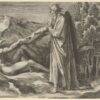Category: Evangelical Calvinist
Writings from the blog: Athanasian Reformed (aka The Evangelical Calvinist). Senior Reformed scholars present a coherent and impassioned articulation of Calvinism for today’s world.
The Spoken Word of God Theology for Us: On a Dialogical Theology
Dialogical theology. It is one of our theses we put forward in our first Evangelical Calvinism book. What is it; what are its entailments; and why am I such a strong proponent of it? In nuce, dialogical theology is exactly what it sounds like: it is a theological “method” that allows the object of theology, who is also Subject for us, to confront us, to speak to us first that we might speak to Him; that we might come to know Him as He knows Himself from a center in Himself for us in Jesus Christ. So, this approach, this…
The Soylent Green of American and Global Politics
God’s judgment, I would suggest, entails false choices often times. In this case, America is faced with a POTUS decision wherein Kamala Harris&co. seemingly are the archrivals of humanity all the way down. But then there is Trump. Trump has radically changed his tune in regard to abortion. He supports the accessibility of the abortion pill by mail; he has had the RNC, effectively, change their official platform on abortion and the abortion pill; he is for abortion in cases of rape and incest. Not to mention, he gave us the lockdowns, warp speeded the deadly vaccines, and is for…
The Vultures Have No Knowledge of God’s Kingdom: Living in the Theology of the Cross
for we walk by faith, not by sight . . .[1] It is certain that man must utterly despair of his own ability before he is prepared to receive the grace of Christ. That person does not deserve to be called a theologian who looks upon the »invisible« things of God as though they were clearly »perceptible in those things which have actually happened« (Rom. 1:20; cf. 1 Cor 1:21-25), he deserves to be called a theologian, however, who comprehends the visible and manifest things of God seen through suffering and the cross. A theology of glory calls evil good and good…
To Be Or Not To Be a Genuinely Christian Theologian
To be genuinely Christ conditioned is to be a true Christian theologian. To be a speculative theologian, that is a purely metaphysical theologian, is to go beyond the Word of God, which runs contrary to the Protestant ‘Scripture Principle,’ and a radical commitment to a Theology of the Word of God. To find a genuine Christian theologian of import in the history of interpretation is not always an easy task. There are many who claim the name of Christ—and I am not doubting their salvation in any way—but then fill up their respective theologies with straw that has been cultivated…
‘Epistemological Inversion’: God Knowing Us First So We Might Know Him
I remember when I was in Bible College, studying apologetics vis-à-vis worldview class, an axiom of sorts was presented to us in regard to a God-world relation: 1) God is prior to us ontologically, 2) humanity is prior to God epistemologically. Does the reader spy a problem with this arrangement; maybe an inherent dualism wherein there is seemingly both an abstract God from humanity, and an abstract humanity from God? When I first heard this axiom it intrigued me, but didn’t sit all that easy with me either. It took me awhile, like years, including going through seminary, and then…
On the Beauty and Reality of Holy Scripture
Here’s a short reflection on Scripture I posted on my other social media accounts a couple of weeks ago. When you inhabit Scripture, over long periods of time, the intricate beauty and artistry of its interwoven reality is undeniable. You realize that you’re reading a literal miracle, particularly as you encounter Jesus Christ on every page turned. Its Divine and Triune imprimatur is everywhere to behold within its Holy binding. Athanasian Reformed
Contra epistemological Arian[os]
Too often, a stress on the centrality of the incarnation is dismissed, by liberals and conservatives alike and without clear argument, as “Barthian” or “Christomonist,” thereby giving them permission to function as epistemological Arians.[1] What do Alan and Andrew Torrance mean: ‘epistemological Arians?’ They are simply noting that if there is some type of general independent free-floating ontological knowledge of God without being radically grounded in God’s own Self-revelation in the Son, the Logos of God, Jesus Christ, that in fact such knowledge would be something that is finally subordinate to God; something that was abstract and a thing that…
Against Cultural Christianity and Christian [Inter]Nationalism: With Reference to Alan and Andrew Torrance
Things remain politically charged in the world, clearly; especially during this season of time as we lead up to the American presidential election in November. Ever since Trump, in 2016, it seems the balance of powers in the world have been disrupted, to a point that they are no longer willing to conceal their movements. These are indeed, trying and confusing times for Christians. Many simply want nothing to do with the politick, which is very understandable. Personally, I have grown weary of such things as well. And yet as Christians we are to be salt and light in the…
A Christological Reading of Holy Scripture Contra the neo-Marcionite “Bible Teachers” of the 21st Century
Let me be forthrightly clear: to follow a Christologically conditioned reading of Holy Scripture is not to be, at the same time, an implicit Marcionite. It is also not to suggest that the Old Testament history is simply the Hebrew peoples’ progressive knowledge of God, and thusly their writing thereof, as if it isn’t in fact heilsgeschichte, or the story of God’s in-breaking activity all throughout ‘salvation history,’ providentially and actively orienting and working through the events of said history in order to eventuate the actualization of his pre-destination in Jesus Christ to be for the world and not against…
Dark Heart-Inscrutable Sin Contra Natural Theology-Law
“The heart is more deceitful than all else And is desperately sick; Who can understand it? “I, the Lord, search the heart, I test the mind, Even to give to each man according to his ways, According to the results of his deeds. –Jeremiah 17:9–10 This is going to be a very brief screed on the inscrutable reality of sin and evil. As the prophet Jeremiah speaks for Yahweh, or as Yahweh speaks directly through Jeremiah, something is quite clear about the human fallen heart: i.e., it is beyond our comprehension. The only commentary or explicator provided for its depths comes in the incarnation of God in Jesus…






![Contra epistemological Arian[os]](http://protestantbeliefs.com/wp-content/uploads/2024/08/arius-100x100.jpg)
![Against Cultural Christianity and Christian [Inter]Nationalism: With Reference to Alan and Andrew Torrance](http://protestantbeliefs.com/wp-content/uploads/2024/08/aushwitz-100x100.jpg)
